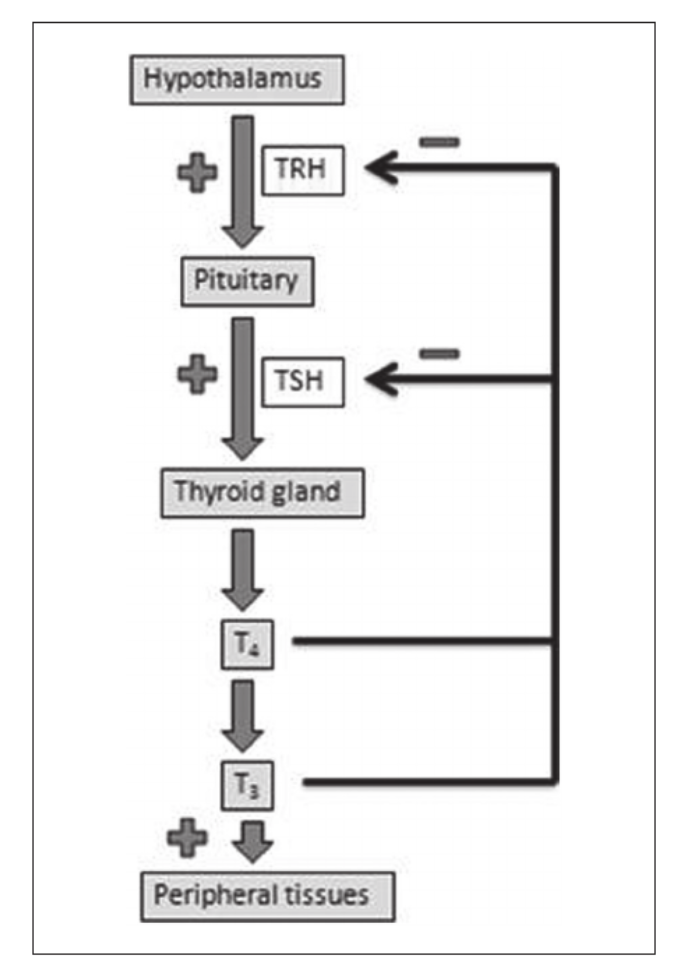A Primer on the Thyroid and signs it may not be healthy
Learn more at Thyroid.org
The thyroid is a butterfly-shaped gland located in the front of the neck. This small gland produces hormones that regulate the body's metabolic rate including controlling heart, muscle and digestive function, brain development, and bone maintenance. The thyroid is like a thermostat for our metabolic system. It has an influence on nearly every function and organ in the body to some degree, meaning that if the thyroid is not functioning well, it could have a ripple effect to create many health concerns.
February 2013 Clinical Pediatrics 52(4)
To understand the thyroid, it is helpful to understand its connection to the pituitary gland in the brain. The pituitary gland releases thyroid-stimulating hormone (TSH). TSH in turn, stimulates the thyroid gland to make T3 (triiodothyronine) and T4 (thyroxine) thyroid hormones. The majority of hormone produce by the thyroid is the inactive hormone T4. When it hits the bloodstream, it is converted to T3, the active form of the hormone. There is a feedback loop between the thyroid hormones and the brain. When there is enough hormone in the blood the TSH stops getting released. This interaction between the pituitary, T3, T4, TSH, and thyroid is going on constantly to keep hormone levels in balance. T4 and T3 are the thyroid hormones that have an influence on nearly every cell of the body.
The key to understanding the thyroid’s role in maintaining optimal health is understanding that it’s function is greatly affected by its environment. Diet, stress, inflammation, and pollution can all drastically change the thyroid’s function. To optimize hormone levels these outside factors must also be optimized which luckily can ultimately be beneficial for your overall health.
What causes thyroid problems?
Thyroid disorders are very common. According to the America Thyroid Association, 12% of the US population will develop a thyroid condition during their lifetime with women being five to eight times more likely to suffer than men. One in eight women will develop a thyroid problem.
Institute for Functional Medicine (IFM.org)
The cause of thyroid disorders is often multifactorial. Triggers for dysfunction can include the following:
Autoimmune disease- The most common causes of low and high thyroid function are autoimmune thyroid conditions like Hashimoto’s or Grave’s thyroiditis.
Nutrient deficiencies like vitamin D, iron, zinc, selenium, or high or low levels of iodine
High stress levels- Thyroid function can be down-regulated during stressful conditions. Cortisol, a stress hormone, can suppress the release of TSH by the pituitary gland, which then means the thyroid won’t get told to produce hormones.
Chronic Infections like Epstein-Barr virus and Yersinia enterocolitica
Radiation or surgery affecting the thyroid gland
Family history of thyroid conditions
Symptoms of a Thyroid disorder
Because the thyroid can affect so many organs and systems in your body, the range of symptoms caused by a thyroid problem can be widespread.
Symptoms of Under-active Thyroid
(Hypothyroid):
Fatigue
Increased sensitivity to cold
Constipation
Dry skin
Weight gain
Puffy face
Hoarseness
Muscle weakness
Elevated blood cholesterol level
Muscle aches, tenderness and stiffness
Pain, stiffness or swelling in your joints
Heavier than normal or irregular menstrual periods
Thinning hair
Slowed heart rate
Depression
Impaired memory
Enlarged thyroid gland (goiter)
Symptoms of Over-active Thyroid
(Hyperthyroid):
Unintentional weight loss
Rapid heartbeat (tachycardia) — commonly more than 100 beats a minute
Irregular heartbeat (arrhythmia)
Pounding of your heart (palpitations)
Increased appetite
Nervousness, anxiety and irritability
Tremor
Sweating
Changes in menstrual patterns
Increased sensitivity to heat
Frequent bowel movements
An enlarged thyroid gland (goiter)
Fatigue, muscle weakness
Difficulty sleeping
Skin thinning
Fine, brittle hair
What to do if you suspect a thyroid problem
Thyroid disorders can be diagnosis with routine blood work. Talk to your health care provider about the symptoms you may be experiencing. At Relish Health, a thyroid evaluation includes checking TSH, free T4, free T3, and thyroid antibodies in order to understand how your thyroid functions on multiple levels. Thyroid ultrasounds are sometimes needed to check thyroid anatomy.
Getting a proper diagnosis is the first step in healing your thyroid and reducing unwanted symptoms. Relish Health is here to help.



